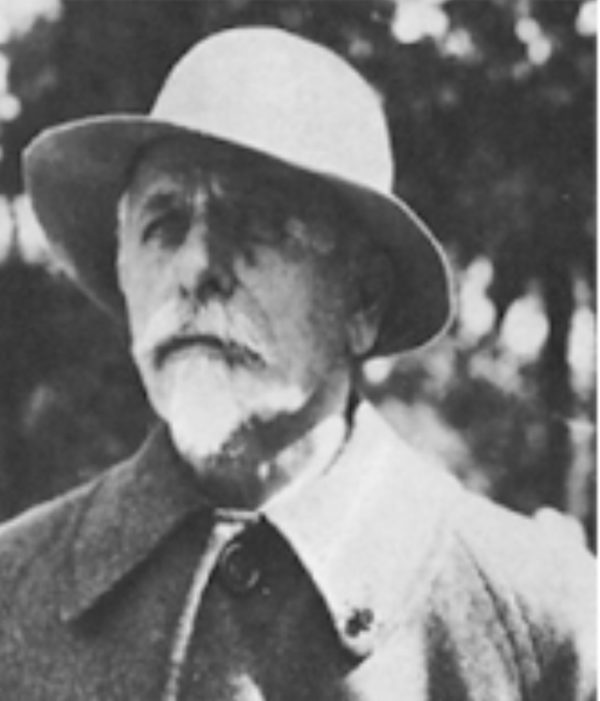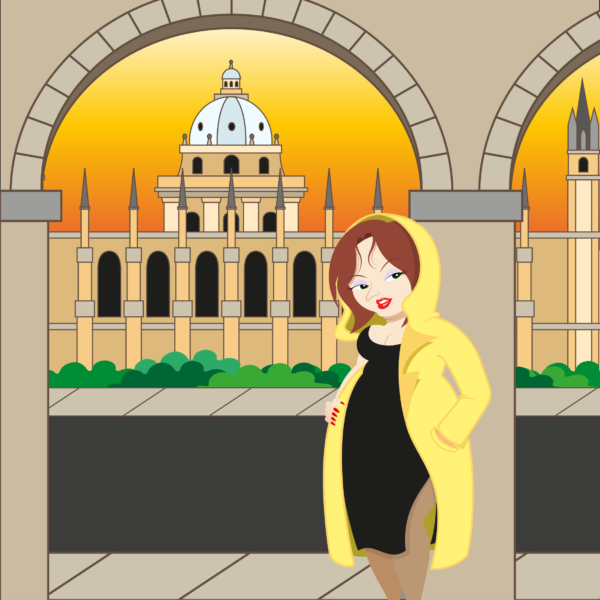A Vision in Buenos Aires
Series: Tales of cities
By Pierre Scordia
In the crowded Avenida Santa Fé, she was surprised by the sudden darkness in the sky. Hoping to reach Café Tortoni before getting caught by the winds and torrential showers of a typical Porteño summer, she crossed the street without paying much attention to the pedestrian lights. There was such a heavy traffic jam that afternoon that she could safely zigzag between cars. She just wanted to reach the underground station as fast as she could.
She hurried down the stairs of the Subte like the wind and reached the Scalabrini Ortiz Station platform. It was packed with people. Being five foot nine, Eva was taller than many of her compatriots. She was slim, pretty and always smiling, which came in useful in a crowd as men were always eager to let her pass in front of them. On that day, she wore a white summer dress and was carrying a small airline bag for her books. By contrast, most commuters on the platform were carrying shopping bags; at this time in December, the Argentines rushed to the shops before the skyrocketing inflation rendered their monthly salaries worthless. Eva planned to spend hers tomorrow, a few thousand pesos that she had earned for some translations. Since she had just completed her first year of university; she wanted to go on holiday but couldn’t make up her mind where to go, hesitating between the glamorous Punta del Este, in neighbouring Uruguay and Mar del Plata, at her parents’ summer villa.
She stepped into the subway carriage and sat on the bench, eager to read her book. In these troubled times, it was safest to avoid any eye contact. The country was heading for an economical abyss and the generals in power were getting extremely unpopular. Political crackdown had become ever more brutal.
She was reading “The Picture of Dorian Gray” in its original version. Eva had chosen to study languages because she wanted to travel the world and explore the past through literature. She was fascinated by Britain more than any other country in the world; she had a great admiration for this people who had succeeded in imposing their parliamentary system onto the rest of the world and stoically resisted the Nazi folly. Eva Lebowsky was aware of her father’s Jewish roots, even though she was German from her mother’s side. Yet would she have been in this world had the Nazis not been defeated by the Allies? Would her blondness and fine facial features have saved her? Would General Perón and his nebulous secret society GOU have had her arrested if their German friends had won the war? For a short while Eva became lost in her thoughts until she felt an intense gaze resting on her. She raised her head and realised that a man was staring at her. She became uncomfortable.
It was clear he wasn’t from the capital. He seemed to her to be an Indio with his dark skin, shiny wide black eyes and slightly hooked nose. He was probably from a northern province or perhaps even Bolivia. Although his face had an unusual beauty, his grieved expression troubled her. His sensual gaze, intense yet sad, struck her. She had a bad premonition. She was struggling to avoid eye contact with him. She buried her nose into her novel and carried on with her reading.
When the train arrived at Callao station, many people entered the carriage. A pregnant woman asked Eva if she would give up her seat, which she gladly did. She stood up, put her book away in her bag and firmly held onto a suspended handle. Suddenly she found herself surrounded by many passengers, mostly men. The sticky heat of this hot summer day made people sweat and all those mixed body odours bothered her. The stranger discretely and slowly came closer to her and stared at her once again. Eva stood up to his impudent gaze but very soon she began to feel unwell, became dizzy and fainted.
She was propelled to a different time, a different place. She stood alone in a deserted street of a Northern city, Santiago del Estero. The weather was hot and dry and the air dusty, giving the impression the place was even emptier than it appeared. Two men wearing suits and sunglasses arrived and forcefully entered a beautiful white bungalow. Five minutes later, they emerged, dragging a man by his arms. His face was bruised and bloodied and his leg seemed injured, perhaps by a bullet. They hurried into a Peugeot car and sped off. Eva kept watching and tracking the car for miles; it seemed she was able to displace herself, just with the power of the mind. Eventually the men drew up in front of an elegant house. Strangely enough, they couldn’t see her. Inside the house, there were cages containing men and women. They threw the injured young man into one.
Half an hour later, he was dragged out. During a brutal interrogation, he did not say a word, only cried out when his torturer gave him electric shocks to his genitals, removed a nail from his left forefinger and stubbed out a cigarette on his neck. Finally an officer gave the order to take the prisoner to the Naval School of Mechanical Engineering in the federal capital for a “helicopter stroll”. Now Eva could hear the helicopter throbbing above the South Atlantic Ocean. Powerless, she witnessed the swollen face of the young man, who had been drugged, his hands and feet tied to a brick. She wanted to help him but found herself unable to speak or scream, let alone untie him. What was happening to her? She recognised the Indio. He was about to be dropped three thousand feet above the open sea, miles from the shores of Buenos Aires. She found herself falling from the sky, like an angel who had failed to accomplish her mission.
She felt gentle taps on her face. She opened her eyes and saw the strange man. He was holding her with his right arm. She was half lying on the pavement near Tribunales Subte station.
- “Are you ok, Miss? You fainted in the carriage. An ambulance is on its way”
- “I am so confused. I… I don’t know what happened to me. I’ve made such a spectacle of myself. I am so sorry. ”
- “Please, don’t worry. It must be the heat. ”
- “It is very kind of you to have helped me. What’s your name? ”
- “Andrés Carrero, I am a student at the Medical Faculty.”
-“You are not from here, are you?”
- “No, I am from the North, from Santiago del Estero. Have you been there? … Miss, are you alright? You look so pale.”
Terrified by the coincidence, Eva became speechless.
Then she managed to whisper, “Please don’t go back there, I beg you…”
- “Don’t worry about me, Miss. I have no intention of going back to the North of the country. I am far too busy here with my studies. Buenos Aires is my home”, he cheerfully replied.
He stared at her, smiling, then his expression changed to a fixed grin. All traces of joy disappeared in his rictus. He vanished.
Torrential rain started to pour down on the city.
Tears began to stream down Eva’s face.
form-idea.com, 29th September 2020. | ©2017 Pierre Scordia




Fantastic website, thanks.
Hello 😉 Thanks for this! Regards!
It gives me goose bumps!
I could imagine this being the first chapter of a novel; I was drawn in from the very first sentence! Superb illustration too!
That’s the plan! Thank you very much for your comment Ani.